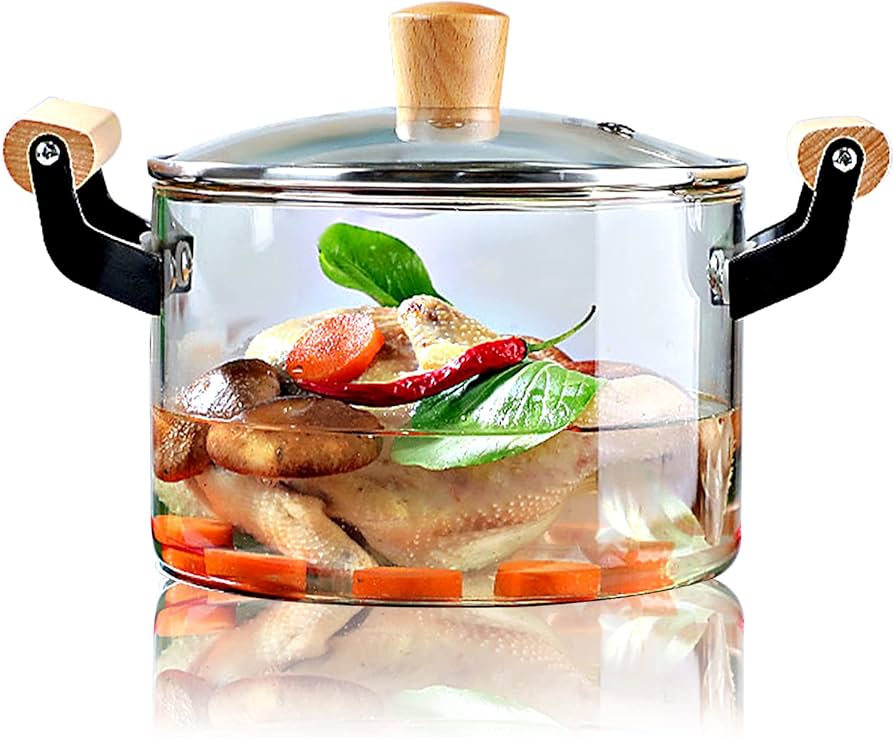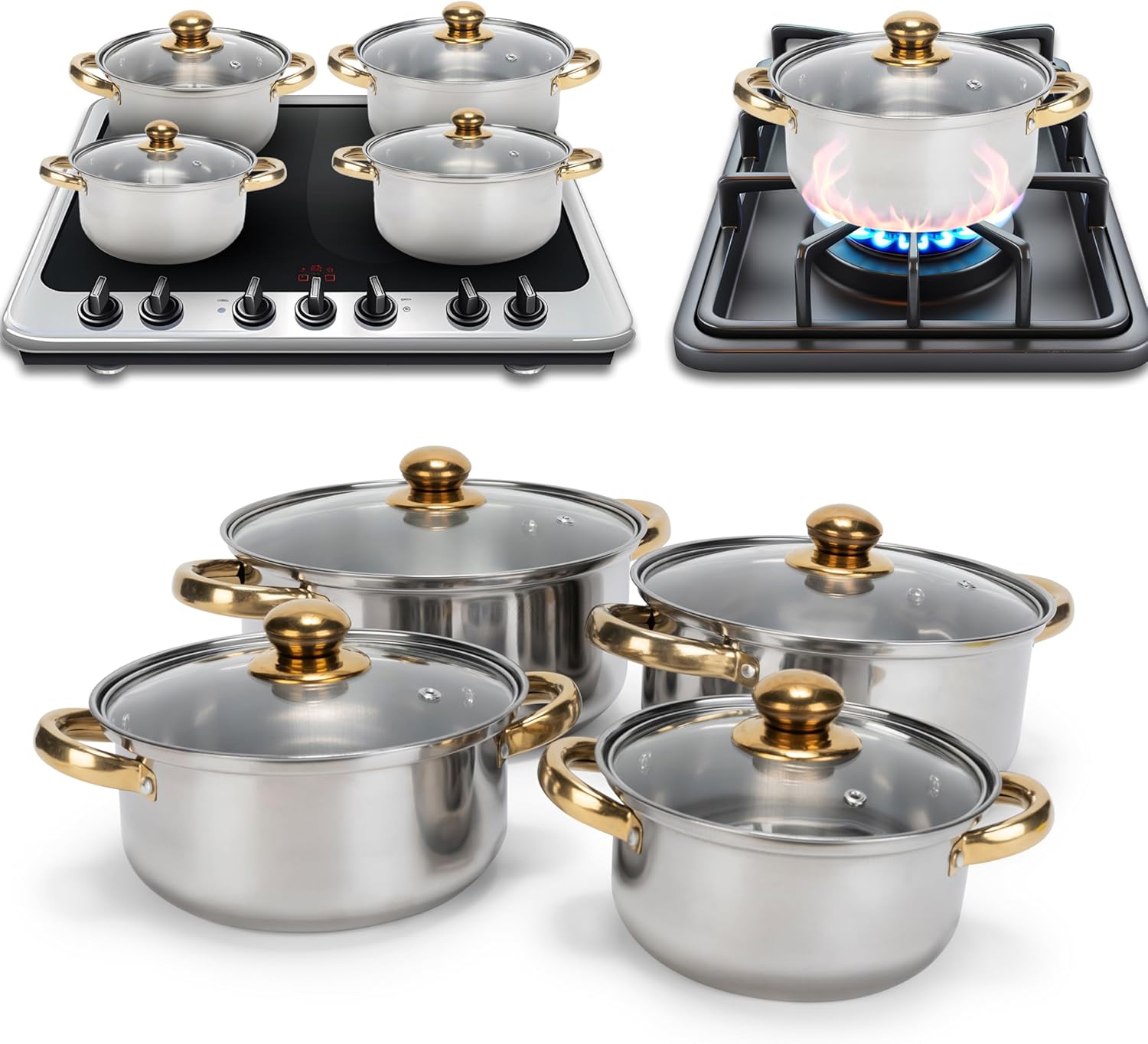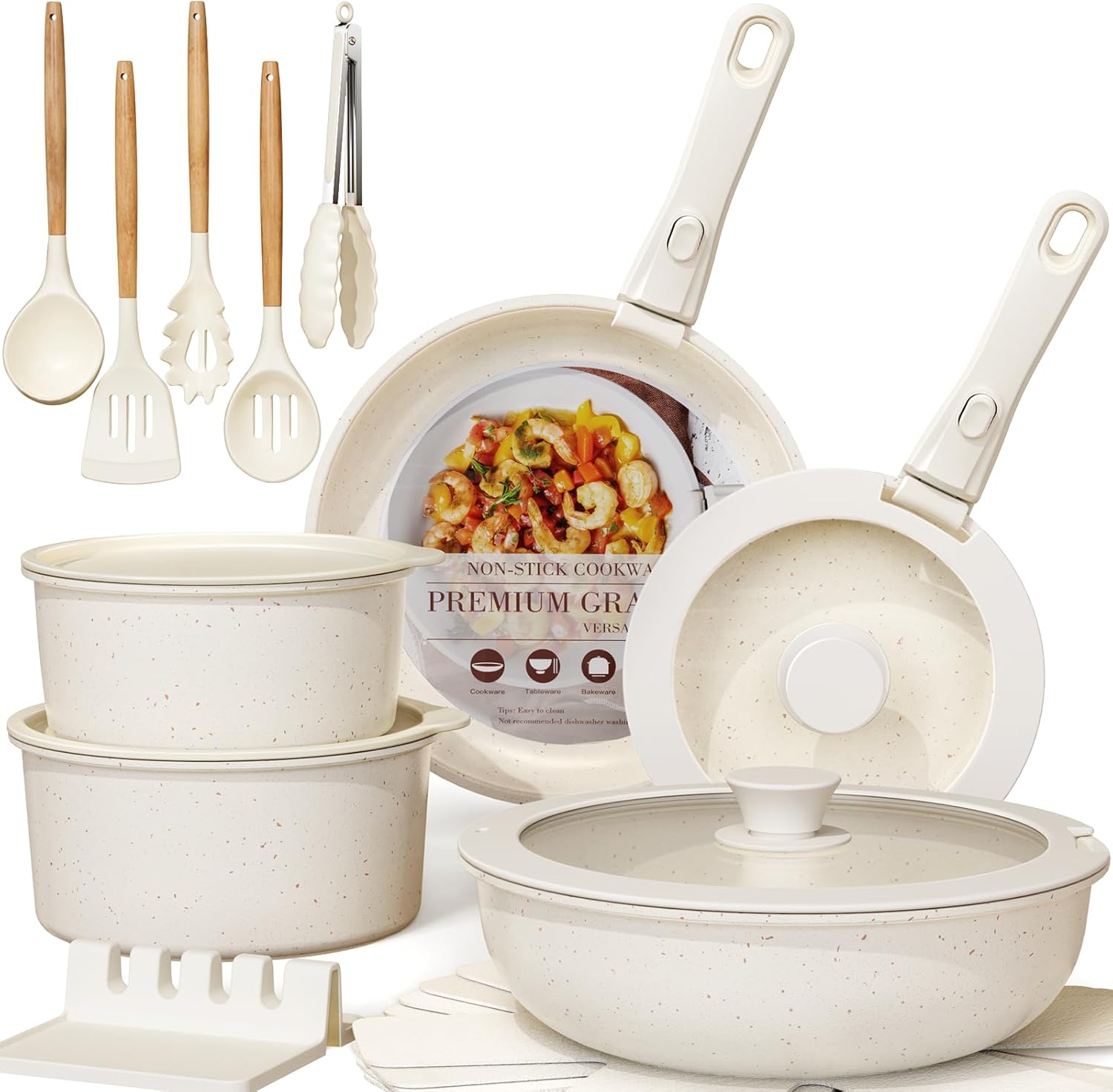Glass cookware is generally safe for cooking, baking, and reheating. It can withstand high temperatures and is often microwave and dishwasher safe.
Glass cookware has gained popularity due to its durability and versatility. Many home cooks appreciate its ability to distribute heat evenly, which helps in achieving consistent cooking results. Unlike some materials, glass does not react with food, ensuring that flavors remain pure.
This cookware also allows for easy monitoring of food as it cooks, thanks to its transparent nature. Moreover, glass is non-porous, making it resistant to stains and odors. With proper care, glass cookware can last for many years, making it a wise investment for both amateur and seasoned chefs alike. Understanding its benefits can enhance your cooking experience significantly.

Credit: leclair.vision
The Heat Is On: Glass Cookware Safety
Glass cookware is popular for many kitchens. It is important to understand its safety features. Knowing how glass cookware handles heat can help you cook safely.
Temperature Tolerance Of Glass
Glass cookware can withstand high temperatures. Most glass dishes are safe up to 425°F (218°C). Some specialized glass can handle even more heat.
Here’s a quick look at different types of glass cookware:
| Type of Glass | Max Temperature |
|---|---|
| Borosilicate Glass | Up to 500°F (260°C) |
| Tempered Glass | Up to 450°F (232°C) |
| Regular Glass | Up to 350°F (177°C) |
Always check the manufacturer’s guidelines for exact limits. Using glass cookware above its tolerance can lead to breakage. Always allow glass cookware to cool before washing it.
Thermal Shock Resistance
Glass cookware is sensitive to sudden temperature changes. This is known as thermal shock. Rapid temperature shifts can cause glass to crack or shatter.
To avoid thermal shock:
- Preheat the oven before placing glass dishes inside.
- Avoid putting hot glass directly into cold water.
- Use room temperature ingredients when cooking.
For best results, handle glass cookware with care. Following these tips ensures safety and longevity of your glass items. Enjoy cooking with confidence!

Credit: www.amazon.com
Shattering Myths: Understanding Glass Cookware
Many people worry about using glass cookware. They fear it might shatter or break easily. Understanding the facts can help ease these concerns. Let’s explore the composition and types of glass used in cookware.
Composition Of Glassware
Glass cookware is made from a special type of glass. This glass is strong and durable. It can handle high temperatures without breaking. The main components of glass include:
- Silica: The primary ingredient that forms glass.
- Soda Ash: Lowers the melting point of silica.
- Lime: Adds stability and durability.
These components create a non-reactive surface. This means it won’t interact with your food. It’s safe for cooking and baking.
Types Of Glass Used In Cookware
Different types of glass are used in cookware. Each type has unique properties. Here are the main types:
| Type of Glass | Features | Best Uses |
|---|---|---|
| Borosilicate Glass | Heat resistant, less prone to thermal shock | Ovens, microwaves, and freezers |
| Soda-lime Glass | Common, affordable, but less durable | Casual baking and serving dishes |
| Tempered Glass | Strengthened through heating, very durable | Safe for stovetop and oven use |
Each type offers safety and durability. Choose the right glass cookware for your needs. Enjoy cooking without fear of breakage!
Clear As Glass: Health Concerns Addressed
Many people worry about the safety of cookware. Glass cookware stands out as a safe choice. It offers numerous health benefits. This section covers important health aspects of glass cookware.
Non-toxic Nature Of Glass
Glass is made from natural materials. It does not contain harmful chemicals. This makes glass cookware a non-toxic option. Here are the key benefits:
- Safe to Use: Glass cookware is safe for food.
- Natural Composition: It consists of silica, soda, and lime.
- Odorless: Glass does not hold odors from food.
- Easy to Clean: It cleans easily without harsh chemicals.
Does Not Leach Chemicals
One major concern with cookware is chemical leaching. Many materials release harmful substances during cooking. Glass cookware does not have this problem.
| Cookware Type | Leaching Potential |
|---|---|
| Glass | No leaching |
| Plastic | Can leach chemicals |
| Metal | May leach metals |
Glass cookware remains stable at high temperatures. It does not release harmful substances. This ensures your food stays pure and healthy.
Choose glass cookware for a safe cooking experience. Enjoy peace of mind knowing your cookware is non-toxic and free from harmful chemicals.
In The Oven’s Embrace: Glass Cookware Usage
Glass cookware is a popular choice for baking. It offers durability and versatility. Using glass safely in the oven enhances your cooking experience. Let’s explore how to get the best results.
Best Practices For Baking
Following best practices ensures safe and efficient baking. Here are key tips:
- Preheat the Oven: Always preheat your oven before placing glass cookware inside.
- Use the Right Size: Choose glass dishes that fit your oven space well.
- Check for Labels: Look for labels that indicate oven-safe glass.
- Use Low to Moderate Temperatures: Glass performs best at lower temperatures.
Avoiding Sudden Temperature Changes
Glass can break from sudden temperature shifts. Follow these guidelines:
- Do not place cold glass cookware in a hot oven.
- Let glass dishes come to room temperature before baking.
- Avoid placing hot glass cookware directly on cold surfaces.
- Do not transfer glass from the freezer to the oven.
By following these tips, you keep your glass cookware safe. Enjoy baking with confidence!
Beyond The Oven: Glass Cookware Versatility
Glass cookware offers remarkable versatility in the kitchen. It goes beyond the traditional oven use. You can safely use it in the microwave and on the stovetop. This makes it a great choice for various cooking methods.
Microwave Safety
Glass cookware is perfect for microwave use. It heats food evenly and prevents hot spots. Here are some important points about microwave safety:
- Use microwave-safe glass only.
- Avoid thermal shock by not taking it from freezer to microwave.
- Check for any metal parts on the cookware.
- Cover food with a microwave-safe lid to keep moisture in.
Many brands label their glass cookware as microwave-safe. Always check the label before using.
Stovetop Adaptability
Some glass cookware can be used on the stovetop. This feature adds to its versatility. However, not all glass cookware is stovetop safe. Here are key points to remember:
| Type of Glass Cookware | Stovetop Safe? |
|---|---|
| Borosilicate Glass | Yes |
| Tempered Glass | Yes (with caution) |
| Regular Glass | No |
Use a low to medium heat setting. Rapid temperature changes can cause breakage. Always follow the manufacturer’s instructions for safe use.
Cleaning Up: Maintenance And Care
Glass cookware is popular for its durability and versatility. Proper cleaning and care ensure its longevity. Follow these tips to keep your glass cookware looking new.
Cleaning Glass Cookware
Cleaning glass cookware is simple. Follow these easy steps:
- Cool Down: Allow cookware to cool before cleaning.
- Use Warm Water: Rinse with warm, soapy water.
- Soft Sponge: Use a soft sponge or cloth.
- Avoid Abrasives: Never use steel wool or harsh scrubbers.
- Rinse Thoroughly: Ensure all soap is removed.
- Dry Completely: Use a clean towel to dry.
For tough stains, soak the cookware in warm, soapy water. This helps loosen food particles.
Avoiding Scratches And Cracks
Preventing scratches and cracks keeps your glass cookware safe.
- Handle with Care: Avoid dropping or bumping glass items.
- Use Silicone Utensils: They do not scratch surfaces.
- Store Properly: Stack cookware with protection in between.
- Avoid Sudden Temperature Changes: Don’t move hot glass to cold surfaces.
Inspect cookware regularly for any signs of damage. Discard any that show cracks or significant scratches.
Lifespan Of Glass Cookware: When To Replace
Understanding the lifespan of glass cookware is crucial for safety and performance. Knowing when to replace your glass items can prevent accidents and ensure your meals cook evenly. Here, we’ll explore the signs that indicate it’s time for a replacement.
Signs Of Wear And Tear
Glass cookware can show visible signs of damage. Be alert to the following indicators:
- Cracks: Even small cracks can weaken the structure.
- Chips: Chips on the edges can cause breakage.
- Cloudiness: A cloudy appearance may indicate wear.
- Discoloration: Dark spots or stains can affect food safety.
Inspect your cookware regularly. Replace any items that show these signs. Using damaged glass cookware can lead to accidents in the kitchen.
Durability Over Time
Glass cookware is generally durable. With proper care, it can last many years. Here is a breakdown of typical lifespans:
| Type of Cookware | Average Lifespan |
|---|---|
| Baking Dishes | 5-10 years |
| Storage Containers | 3-5 years |
| Measuring Cups | 5+ years |
Factors like usage frequency and care practices affect durability. Always handle glass cookware with care. Avoid sudden temperature changes to extend its life.

Credit: www.reddit.com
The Verdict: Weighing The Pros And Cons
Choosing the right cookware can be tricky. Glass cookware offers unique benefits and some drawbacks. Understanding these factors helps you make an informed choice.
Benefits Of Glass Cookware
- Non-reactive surface: Glass does not react with acidic foods.
- Easy to clean: Glass is dishwasher safe and easy to scrub.
- Microwave safe: Most glass cookware is safe for microwaves.
- Visible cooking: You can see food while it cooks.
- Durability: High-quality glass withstands temperature changes.
- Eco-friendly: Glass is recyclable and less harmful to the planet.
Potential Drawbacks
- Fragility: Glass can break or shatter easily.
- Heat retention: Glass heats slowly compared to metal.
- Price: Glass cookware can be more expensive than other options.
- Weight: Glass cookware is often heavier than alternatives.
- Limited stovetop use: Not all glass cookware is stovetop safe.
| Feature | Glass Cookware | Other Cookware |
|---|---|---|
| Reactivity | Non-reactive | Can be reactive |
| Cleaning | Easy to clean | Varies |
| Weight | Heavier | Lighter |
| Durability | Can shatter | Generally more durable |
Frequently Asked Questions
Is Glass Cookware Safe For Oven Use?
Yes, glass cookware is safe for oven use. It can withstand high temperatures, making it ideal for baking and roasting. However, avoid sudden temperature changes to prevent breakage. Always check the manufacturer’s guidelines for specific temperature limits.
Can Glass Cookware Go In The Microwave?
Absolutely, glass cookware is microwave-safe. It allows for even heating and does not leach chemicals into your food. Always ensure that your glass cookware is labeled as microwave-safe to avoid any accidents. Avoid using metal lids or decorations when microwaving.
Is Glass Cookware Safe On The Stovetop?
No, glass cookware is generally not safe on the stovetop. It can crack or shatter due to direct heat. Always use appropriate cookware designed for stovetop cooking. Reserve glass cookware for oven and microwave use only.
How To Care For Glass Cookware?
Care for glass cookware by hand washing it with mild soap. Avoid abrasive sponges that can scratch the surface. Ensure it cools before washing to prevent thermal shock. Regular maintenance can extend its lifespan and keep it looking new.
Conclusion
Glass cookware offers a safe and versatile option for your kitchen needs. Its durability and ability to withstand high temperatures make it an excellent choice for cooking. By choosing glass, you ensure healthier meals without harmful chemicals. Embrace the benefits of glass cookware for a more enjoyable cooking experience.





Leave a Reply